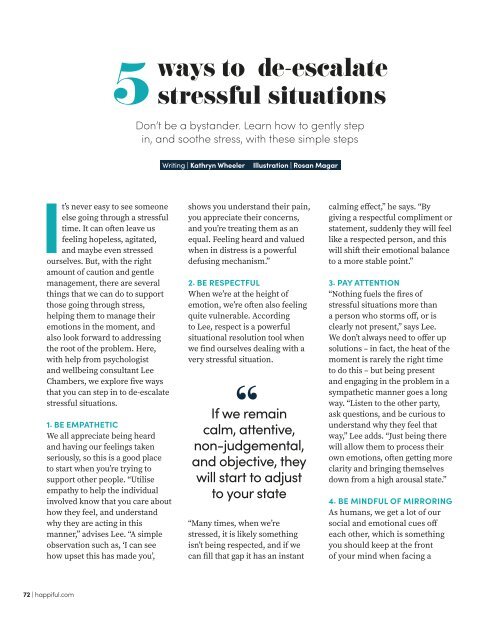You also want an ePaper? Increase the reach of your titles
YUMPU automatically turns print PDFs into web optimized ePapers that Google loves.
5<br />
ways to de-escalate<br />
stressful situations<br />
Don’t be a bystander. Learn how to gently step<br />
in, and soothe stress, with these simple steps<br />
Writing | Kathryn Wheeler<br />
Illustration | Rosan Magar<br />
It’s never easy to see someone<br />
else going through a stressful<br />
time. It can often leave us<br />
feeling hopeless, agitated,<br />
and maybe even stressed<br />
ourselves. But, with the right<br />
amount of caution and gentle<br />
management, there are several<br />
things that we can do to support<br />
those going through stress,<br />
helping them to manage their<br />
emotions in the moment, and<br />
also look forward to addressing<br />
the root of the problem. Here,<br />
with help from psychologist<br />
and wellbeing consultant Lee<br />
Chambers, we explore five ways<br />
that you can step in to de-escalate<br />
stressful situations.<br />
1. BE EMPATHETIC<br />
We all appreciate being heard<br />
and having our feelings taken<br />
seriously, so this is a good place<br />
to start when you’re trying to<br />
support other people. “Utilise<br />
empathy to help the individual<br />
involved know that you care about<br />
how they feel, and understand<br />
why they are acting in this<br />
manner,” advises Lee. “A simple<br />
observation such as, ‘I can see<br />
how upset this has made you’,<br />
shows you understand their pain,<br />
you appreciate their concerns,<br />
and you’re treating them as an<br />
equal. Feeling heard and valued<br />
when in distress is a powerful<br />
defusing mechanism.”<br />
2. BE RESPECTFUL<br />
When we’re at the height of<br />
emotion, we’re often also feeling<br />
quite vulnerable. According<br />
to Lee, respect is a powerful<br />
situational resolution tool when<br />
we find ourselves dealing with a<br />
very stressful situation.<br />
If we remain<br />
calm, attentive,<br />
non-judgemental,<br />
and objective, they<br />
will start to adjust<br />
to your state<br />
“Many times, when we’re<br />
stressed, it is likely something<br />
isn’t being respected, and if we<br />
can fill that gap it has an instant<br />
calming effect,” he says. “By<br />
giving a respectful compliment or<br />
statement, suddenly they will feel<br />
like a respected person, and this<br />
will shift their emotional balance<br />
to a more stable point.”<br />
3. PAY ATTENTION<br />
“Nothing fuels the fires of<br />
stressful situations more than<br />
a person who storms off, or is<br />
clearly not present,” says Lee.<br />
We don’t always need to offer up<br />
solutions – in fact, the heat of the<br />
moment is rarely the right time<br />
to do this – but being present<br />
and engaging in the problem in a<br />
sympathetic manner goes a long<br />
way. “Listen to the other party,<br />
ask questions, and be curious to<br />
understand why they feel that<br />
way,” Lee adds. “Just being there<br />
will allow them to process their<br />
own emotions, often getting more<br />
clarity and bringing themselves<br />
down from a high arousal state.”<br />
4. BE MINDFUL OF MIRRORING<br />
As humans, we get a lot of our<br />
social and emotional cues off<br />
each other, which is something<br />
you should keep at the front<br />
of your mind when facing a<br />
72 | happiful.com

















